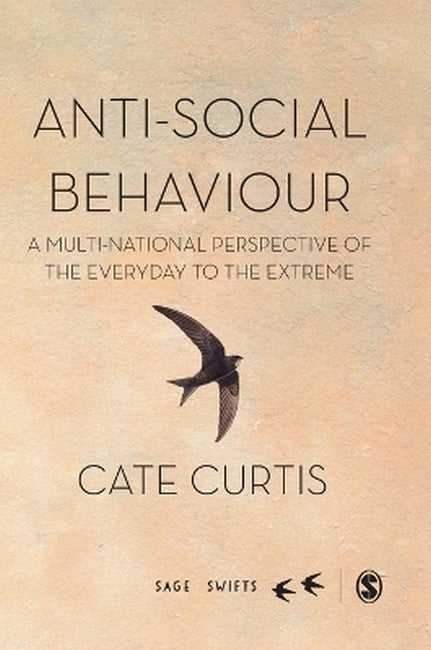Cate Curtis is a Senior Lecturer in the School of Psychology at the University of Waikato. She is a co-author of Generating Data (4 volume set, SAGE, 2016), co-author of Social Research: A Practical Introduction (SAGE, 2011); and co-author of The Social Psychology of Everyday Life (Palgrave. 2010). Her main research interest is the construction of 'risk' and 'resilience', especially with regard to young women, and she teaches a graduate paper in the social psychology of anti-social behaviour. She contributes to the teaching of research methods for psychology at undergraduate and graduate levels, as well as in the area of social psychology.
Request Academic Copy
Please copy the ISBN for submitting review copy form
Description
Introduction Perceptions and Concepts: Constructing Anti-Social Behaviour The Politics of Anti-Social Behaviour: Policies and Values Ordinary Anti-Social Behaviour: Everyday Hassles Anti-Social Behaviour as a Social Activity: Group Processes New Technology, New Media: Transmitting New Behaviour? Prevention, Intervention and Punishment: Risk, Resilience and Recovery
In seven chapters, Antisocial Behaviour neatly and succinctly takes readers through ways to understand and interpret the label of 'antisocial' behaviour in a wider context, showing how it is socially, historically and culturally produced as well as understood in professional health and policing or correctional contexts. In her innovative SWIFT intervention, Curtis also grapples with new forms of antisocial behaviour as imagined in online spaces, and examines the new ways in which communities and governments have sought to police, 'correct', or limit this type of behaviour. The text offers a crisp insightful synthesis of core issues in social psychology. -- Cathy Coleborne A timely work given the present global shift in the use of social media and violence. Cate Curtis' book serves as a multinational mini-meta-analytic review of anti-social behaviours. Each chapter builds developmentally by topic to the concluding chapter that outlines various intervention alternatives. This is a book that will fit well in both undergraduate and graduate courses in psychology, family studies, education (social justice), social welfare, nursing, criminal justice, political science, behavioural economics, sociology, and anthropology. -- Richard Langford Curtis takes the reader through the perceptions and concepts of what we have come to think of as anti-social behaviour, drawing on the work of Emile Durkheim, Sigmund Freud and Robert Merton amongst others. She examines the risk and protective factors related to aberrant behaviour, focusing primarily on the social roots but also considering biological factors. She also considers the role of new technologies and and social media concluding that the public and media perception of ASB often fail to match the evidence and the current levels of concern might be reasonably seen as a moral panic. This book will be an extremely useful resource across many disciplines, not least criminal justice, social welfare, behavioural economics, psychology, sociology and anthropology as it provides a very good introduction to and explanation of what anti-social behaviour (ASB) is and, indeed, what it is not. -- Donald Urquhart * SCOLAG Legal Journal * Cate Curtis' coverage in this book on Anti-social behaviour is breath-taking. It is centred on challenging taken for granted assumptions concerning the three Rs: 'risk', 'resilience' and 'recovery' whilst questioning what is respectable everyday activities and extreme behaviour in culture and society. Her investigation into social behaviour is fast paced and detailed assessing diverse and oppositional arguments as she moves towards a complex assessment of multiple factors, which shape the meaning of anti-social behaviour. Written in an accessible style with scholarly depth, the book will be touchstone for students and researchers in sociology, criminology, media and cultural studies, politics and social policy. -- Shane Blackman Cate Curtis examines anti-social behaviour, starting with the 1998 UK legislation (and the conduct it was designed to suppress), but she expands the scope of ''anti-social behaviour'' to include other western jurisdictions and other, more serious, forms of offending. She adopts an international, comparative approach and combines seminal and contemporary scholarship from the traditions of social psychology, social work, sociology, and criminology. Remarkably, she does all of this in a mere 87 pages of text organised into seven succinct chapters. In the sixth century BCE, Aesop observed that 'good things come in small packages'. He might be right. -- James Oleson

